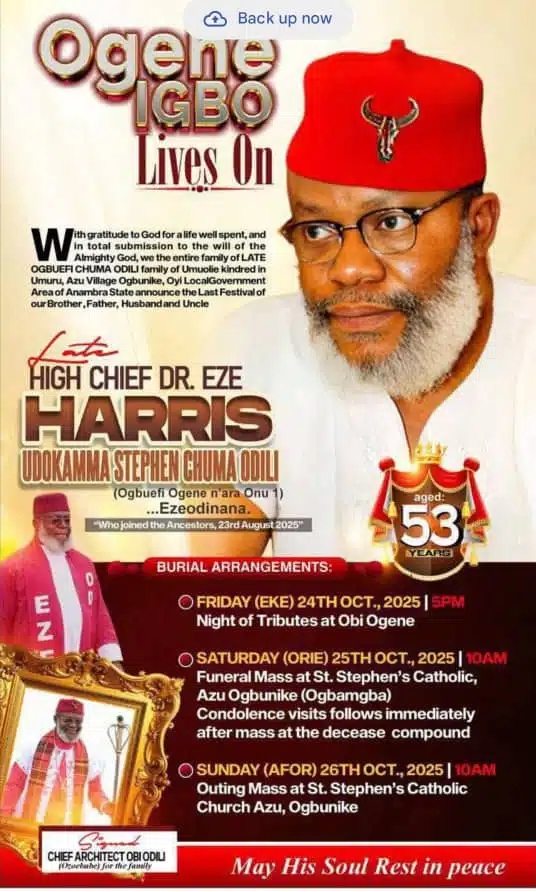By Izunna Okafor, Awka
The family of the late Anambra-born journalist, media consultant, and cultural ambassador, High Chief Dr. Eze Harris Udokamma Stephen Chuma-Odili, popularly known as Ogene Ogbunike or Eze Odinana, has officially announced his burial arrangements.
According to the statement signed by Chief Arch. Obi Odili (Ozoebube) on behalf of the family, the funeral rites will commence on Friday, October 24, 2025, with a Night of Tributes scheduled to hold at Obi Ogene, Ogbunike, beginning at 5 p.m.
He said the following day, being Saturday, October 25, 2025, will feature a Funeral Mass at St. Stephen’s Catholic Church, Azu Ogbunike (Ogbamgba) by 10 a.m., after which condolence visits will follow immediately at the deceased’s compound. The ceremonies, he noted, will conclude with an Outing Mass on Sunday, October 26, 2025, at the same church, beginning at 10 a.m.
The family expressed their gratitude to God for a life of impact and legacy, describing the late Chuma-Odili as a devoted son, a visionary leader, and a man who lived and died in the service of truth, culture, and humanity.
“Ogene Igbo lives on,” the poster partly reads, while inviting friends, associates, colleagues, and well-wishers to join the family in celebrating his life and accomplishments.
It would be recalled that the entire Ogbunike community and Anambra State media fraternity were thrown into mourning following the sudden death of Dr. Chuma-Odili, who reportedly slumped during a community function while interacting joyfully with women dancers. He was rushed to the hospital and placed in the Intensive Care Unit but sadly succumbed a few hours later. His death, which came barely a day after he had shared a message of peace and unity on social media, shocked many who described it as both symbolic and prophetic.
The late Ogene Ogbunike was renowned as a fearless journalist, political commentator, cultural custodian, and founder of Anambra Core Media Advocates (ACMA). A strong voice for truth and justice, he was also known for his deep passion for Igbo heritage and community development.
Until his death, he was actively involved in the struggle for the igweship of his community and was widely respected for his intellect, courage, and staunch advocacy for good governance. His demise has, since then, continued to attract tributes from friends, colleagues, and admirers across Nigeria and beyond, who describe him as a man who lived for his people and died in their service.












